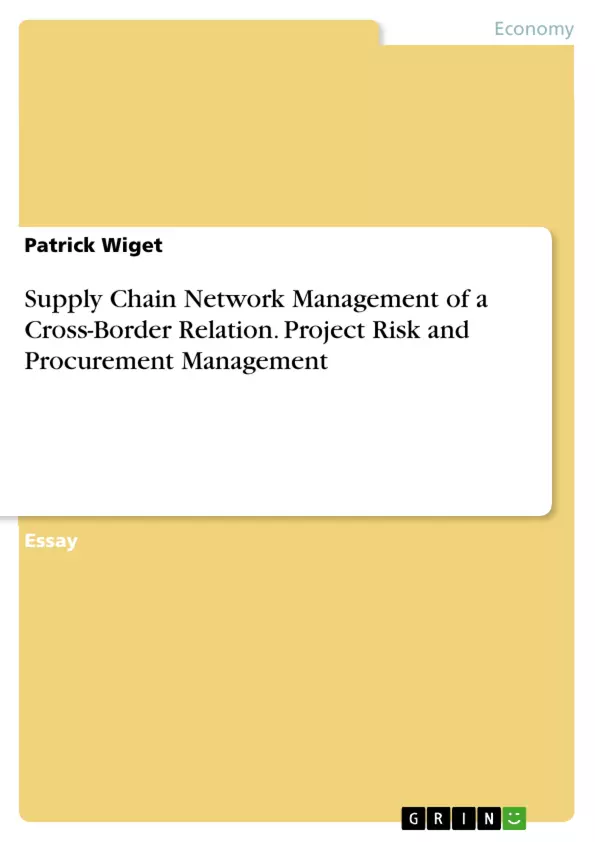This paper evaluates the relationship and the supply chain between a UK organization importing food and a Greek organization exporting food. The economic risks, issues of sustainability, environmental problems and scarcity of raw materials will be discussed regarding the concept of a procurement management network. The main question is how such a network can be managed on a global scale, while looking at possible risks and case studies dealing with specific parts of the subject.
The paper is structured linearly to give a clear representation of the important aspects of procurement and supplier relationship management (SRM). The important aspects will be assessed individually with a focus on how a sustainable relationship can be built considering that the economic situation could change rapidly in a cross-border relation.
Firstly, it is essential to look at the SRM as a basis of the process of procurement. This is followed by an assessment of how the authorities should be involved and how a contractual concept can support a supply chain relation network. Furthermore, possible economic risks will be taken into consideration. These economic risks are in juxtaposition to a potential scarcity of raw materials and the difficulties that international trade has to deal with in order to show responsibility for an increasing environmental threat. Finally, it will be discussed, how sustainability can be ensured. All of those various aspects of procurement management will be supported by case studies.
Inhaltsverzeichnis (Table of Contents)
- I. Introduction.
- II. Procurement Management..
- a. Supplier Relationship Management..
- b. Authorities...
- c. Contract.
- d. Economical Risk..
- e. Scarcity of Raw Materials.
- f. Environmental Risk
- g. Sustainability ......
- III. Conclusion..
- IV. Reference.........
Zielsetzung und Themenschwerpunkte (Objectives and Key Themes)
This paper explores the crucial aspect of procurement relationship management in an international food supply chain, focusing on the import of food from Greece to England. The paper emphasizes building sustainable relationships within the supply chain, considering the volatile nature of economic conditions in cross-border trade.
- Supplier Relationship Management (SRM) as a foundation for effective procurement.
- The role of authorities in facilitating cross-border trade and supporting contractual agreements.
- The importance of well-defined contracts for ensuring the success of the supply chain network.
- Potential economic risks, scarcity of raw materials, and environmental concerns within the supply chain.
- The critical need for sustainable practices to ensure long-term viability.
Zusammenfassung der Kapitel (Chapter Summaries)
- I. Introduction: This chapter introduces the paper's focus on the procurement relationship between suppliers in an international food supply chain, specifically the import of food from Greece to England. It highlights the importance of sustainable relationships and addresses the challenges posed by economic volatility in cross-border trade.
- II. Procurement Management: This chapter delves into the strategic aspects of procurement management, aiming to control costs and ensure quality through effective negotiation skills and communication between supply chain actors. It emphasizes the role of Supplier Relationship Management (SRM) in strengthening relationships between individual suppliers.
- a. Supplier Relationship Management: This section examines the significance of SRM, emphasizing collaboration among supply chain actors, and the importance of information exchange between farmers, producers, and retailers. It illustrates these points with case studies, including Kentucky Fried Chicken and Marks and Spencer, highlighting the potential disruptions and strategies to mitigate them.
- b. Authorities: This section discusses the responsibility of authorities in establishing regulations for export and import, facilitating business relationships between cross-border supply chain actors. It underscores the need for bilateral contracts and the role of NGOs in providing training and support.
- c. Contract: This section explores the importance of comprehensive contracts that consider the interests of all supply chain actors. It highlights the potential challenges in integrating all actors, especially retailers, into the contractual process, and emphasizes the crucial role of authorities in supporting such contractual processes, particularly in cross-border supply chains.
- d. Economical Risk: This section, which is not covered in the preview, focuses on the economic risks involved in international procurement, including currency fluctuations, market instability, and potential disruptions to the supply chain.
- e. Scarcity of Raw Materials: This section, which is not covered in the preview, addresses the challenges posed by scarcity of raw materials, exploring strategies for managing resources and mitigating potential risks.
- f. Environmental Risk: This section, which is not covered in the preview, examines the environmental concerns associated with international food trade, including transportation emissions, agricultural practices, and waste management.
- g. Sustainability: This section, which is not covered in the preview, explores the crucial role of sustainable practices in ensuring the long-term viability of the supply chain network, including responsible sourcing, environmental stewardship, and ethical sourcing.
Schlüsselwörter (Keywords)
This paper focuses on key concepts such as international food supply chain management, procurement relationship management, supplier relationship management (SRM), cross-border trade, sustainability, economic risks, scarcity of raw materials, and environmental concerns.
- Quote paper
- Patrick Wiget (Author), 2019, Supply Chain Network Management of a Cross-Border Relation. Project Risk and Procurement Management, Munich, GRIN Verlag, https://www.hausarbeiten.de/document/976493


